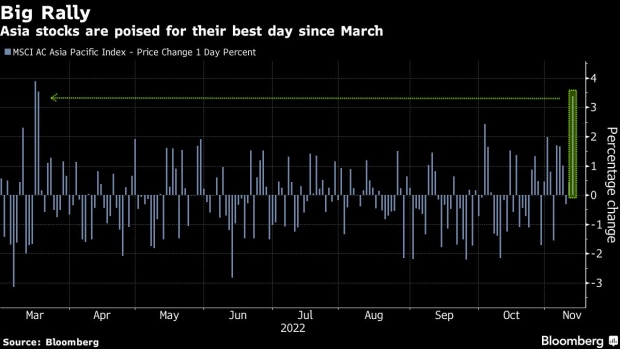Nov 10, 2022
Asian Stocks Jump Most Since March, Joining US CPI-Fueled Rally
, Bloomberg News

(Bloomberg) -- Asia’s stock benchmark jumped by the most since March 2020 as China’s move to ease some rules related to quarantine and flight bans supercharged a rally sparked by softer-than-expected US inflation.
The MSCI Asia Pacific Index climbed as much as 5.1% on Friday, on track for its first back-to-back weekly gain since August. A gauge of Chinese stocks in Hong Kong surged more than 8% after authorities reduced the amount of time travelers and close contacts must spend in quarantine, and pulled back on testing, among other measures. That boosted bets a shift away from the stringent Covid Zero policy may finally be underway.
Regionally, chipmakers soared, driving benchmarks in Taiwan, South Korea and Japan higher. Stocks in India headed for a record, buoyed by strong corporate earnings and a return of foreign investors in the past few months.
Local currencies got a boost as a dollar gauge suffered its worst day since 2009 overnight. Bond yields largely declined as the Federal Reserve appeared closer to moderating its aggressive rate-hike campaign after data showed consumer price increases slowed in October.
“East Asia equities, more vulnerable to tighter US financial conditions could benefit more from US inflation peaking,” said Frank Benzimra, a strategist at Societe Generale SA. “Some Asia central banks are at the end of their tightening cycle and could pivot before the Fed does,” such as South Korea and India.
For Asian stock traders, a more dovish Fed and signs of China’s reopening have been touted as two key catalysts. The regional benchmark is down more than 30% from a peak in February 2021. The moves by Chinese authorities followed a meeting by the nation’s top leaders on Thursday, where a more targeted approach was encouraged to tackle outbreaks.
“With peak Fed in the bag, thanks to a downside surprise in inflation data, pessimism at year-end around the earnings outlook could be offset by optimism on China, mainly if the country takes a less hardline stance on rising Covid cases,” Stephen Innes, managing partner at SPI Asset Management, wrote in a note.
The recent rebound in Chinese shares and the decline in the dollar have helped lift the MSCI Asia equity gauge more than 12% from a trough in October.
Even so, with China continuing to restrict mobility in some major cities amid a renewed surge in cases and the jury still out on the path for interest-rate hikes globally, the outlook for corporate profits is cloudy. Foreign investors have pulled more than $43 billion from emerging Asia excluding China this year, according to Bloomberg-compiled data.
Asia’s earnings picture still looks “soft,” and the market could consolidate over the next six months, Sunil Koul, a strategist at Goldman Sachs Group Inc., told Bloomberg Television.
MARKETS AT A GLANCE
- MSCI Asia Pacific Index up 5%
- Japan’s Topix index up 2.1%; Nikkei 225 up 3%
- Hong Kong’s Hang Seng Index up 7.7%; Hang Seng China Enterprises up 8.3%; Shanghai Composite up 1.7%; CSI 300 up 2.8%
- Taiwan’s Taiex index up 3.7%
- South Korea’s Kospi index up 3.4%; Kospi 200 up 3.8%
- Australia’s S&P/ASX 200 up 2.8%; New Zealand’s S&P/NZX 50 up 2%
- India’s S&P BSE Sensex Index up 2%; NSE Nifty 50 up 1.8%
- Singapore’s Straits Times Index up 1.7%; Malaysia’s KLCI index up 1.3%; Philippine Stock Exchange Index up 1.9%; Jakarta Composite Index up 1.8%; Thailand’s SET index up 1.1%; Vietnam’s VN Index up 0.8%
--With assistance from Abhishek Vishnoi, Aya Wagatsuma, Shery Ahn and Haidi Lun.
©2022 Bloomberg L.P.






